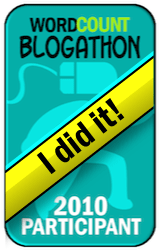Fault.
Who is to blame for your pain and suffering? Is it him? Is it her? Is it them? Does it have to be me? Why does anyone have to be at fault, anyway?
One of my guest commenters used this word, the "f" word, today, and it sparked today's thoughts.
The answer is "no" to all of the above. No one is to blame, necessarily, that is, if you can remove the word from your vocabulary.
Leave "fault" at the courts. Bringing it into your personal relationships--even your personal relationship with you--is like begging for conflict. Owning responsibility is not about fault. Rather, it's about realizing what you can and cannot control. The fault part is irrelevant. Slip that word into an argument, and the argument continues. Why? Because no one really wants the blame, at least not for another person's words or actions.
Even if I slapped you across the face, I'd find a good reason for doing it, and it wouldn't be my fault. That is, if that's the way I processed responsibility. And believe me, I did process it exactly like that at one point in my life.
I can remember an argument I had with my daughter, who was a teenager at the time. She wound up getting so angry, she spit at my face. Do you know what I did? I spit right back at her. I was the adult, and, yet, there I was, acting just like the child. It was ridiculous. My behavior was ridiculous. I allowed anger to control me. It didn't matter what she had done. To this day, I couldn't tell you why we were upset with each other. What I do know is that I really messed up. At that time in my life, however, I could not have accepted that. I wouldn't have. Of course it was her fault. She did it first, right?
Do you hear the childishness behind this story?
It's the perfect example of why fault is not the issue. Self-responsibility is. What do I have control over? One answer. Me. I'm not talking about the parent of a toddler, of course. That's different. I'm talking about two adults, really.
The bottom line is this: You are responsible for your feelings, your actions, your outcome. No one else. When you begin to look at your life in that way, then you begin to let go of the fault concept--the blame--and your challenges in life become less conflicted. You become better able to address them, deal with them, and move on.
Today, it might be a good day to consider removing the "f" word from your vocabulary.
It's something to consider, anyway.
All my best,
Jackie
Thursday, May 22, 2008
Subscribe to:
Post Comments (Atom)












4 comments:
The other way to phrase that guilt or fault thing in that book I'm reading is this:
"In the best of all worlds, I wish that I had not ..."
That doesn't seem F word to me, though.
I could say I wish I hadn't done a million things. But I learned from all of it. I think I understand what you're saying, though. I've experienced more than enough moments in life where I've said something I wish I hadn't, etc. I don't think we want to spend our whole lives apologizing. Have you ever felt like that? I like the "in the best of all worlds" part.
Curious. What's the name of the book you're reading?
This is a good posting for my current life--my son decided to fail enough classes to lose his full-ride scholarship. I am working on remembering it is his life. Not his fault, but his choice. Certainly not my fault, nor is it my choice to make for him...
Very thoughtful entry, Jackie.
Babette,
That's a tough place for a mother to be. We're so used to helping our children navigate through life when they're young. It's hard to let go. But that's our job. Remember, in a previous post, I share with you that we're just practicing. No one knows how to live this life perfectly. That's a good reminder of why we should let there be no fault. "Choice" is the more accurate account of behavior.
All my best,
Jackie
Post a Comment